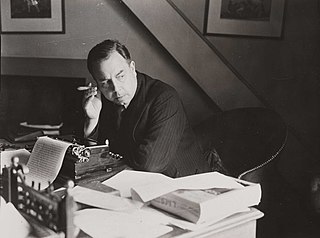A Quote by Walter Kirn
I read somewhere once that in the 1960s, fiction writers were troubled by the notion that life was becoming stranger and more sensational than made-up stories could ever hope to be. Our new problem - more profound, I think - is that life no longer resembles a story. Events intersect but don't progress. People interact but don't make contact.
Related Quotes
It used to be, if you were a reporter, you wrote a story and then you moved on to the next one. We were used to people coming to the New York Times. We waited for them to turn on our website or to pick up our print paper and see what we have. We now understand that we have to make our stories available to our readers. A lot of people get their news from Facebook or Twitter and we want to make sure that they see some of our best stories there, too. We do this more aggressively now than we did before.
Life, my dear Watson, is infinitely stranger than fiction; stranger than anything which the mind of man could invent. We could not conceive the things that are merely commonplace to existence. If we could hover over this great city, remove the roofs, and peep in at the things going on, it would make all fiction, with its conventionalities and foreseen conclusions flat, stale and unprofitable.
My life after childhood has two main stories: the story of the hustler and the story of the rapper, and the two overlap as much as they diverge. I was on the streets for more than half of my life from the time I was thirteen years old. People sometimes say that now I'm so far away from that life - now that I've got businesses and Grammys and magazine covers - that I have no right to rap about it. But how distant is the story of your own life ever going to be? The feelings I had during that part of my life were burned into me like a brand. It was life during wartime.
Is it a coincidence that stories from the private life became more popular just as the grand hope for public redemption through revolution was beginning to sour? I witnessed a similar shift in taste in my own time. In the 1960s, while a hopeful vision of a just society arose again, countless poems and plays concerning politics and public life were written, read, and performed. But after the hope diminished and public life seemed less and less trustworthy, this subject was less in style.
For many years now I have listened to the stories of people with cancer and other life-threatening illnesses as their counselor. From them I have learned how to enjoy the minute particulars of life once again, the grace of a hot cup of coffee, the presence of a friend, the blessing of having a new cake of soap or an hour without pain. Such humble experience is the stuff that many of the very best stories are made of. If we think we have no stories it is because we have not paid enough attention to our lives. Most of us live lives that are far richer and more meaningful than we appreciate.
As a writer, I was deliberately creating an alternate world, and then populating it with experiences and people that I knew in this world, but I'd shake up the mix considerably. And about the same time that the memoir was becoming the dominant popular literary form in the mid to late 90s, I started reading writers who were deliberately playing with the notion of "truth" and "fiction" - that struck me as a much more interesting way to tell certain stories, particularly in the realm of comedy.
Elizabeth Turnage is a woman of grit and grace who lives into the stories of those who join her in this odd journey of seeking God. She honors the complexity of life without ever losing sight of the simple glory of the cross. Her grasp of the mundane and miraculous and their interplay gives a depth and honesty to her story that tugs at the heart and gives us hope our story can matter. Her book will be a clarion call to bring our broken, holy, troubled, and glorious life to the author of all stories: Jesus.
Maybe instead of strings it's stories things are made of, an infinite number of tiny vibrating stories; once upon a time they all were part of one big giant superstory, except it got broken up into a jillion different pieces, that's why no story on its own makes any sense, and so what you have to do in a life is try and weave it back together, my story into your story, our stories into all the other people's we know, until you've got something that to God or whoever might look like a letter, or even a whole word.
People need to understand that what happens in people's homes and behind closed doors, unless you were there, you really shouldn't make any analogy or any assumption, which writers do quite a bit. It's not something I ever for one second thought about. This is not my life story, and I've never told my life story, and I have no interest in telling my life story.
The ad industry isn't struggling for a new set of principles or abandoning the ones that made it great from the start. It's simply in the midst of a business cycle. I don't think it's more profound than that. And despite the economic downturn, I'm having more fun today than at any other moment in my 30-year advertising career. The game is more interesting and more relevant than ever.
We can tell people abstract rules of thumb which we have derived from prior experiences, but it is very difficult for other people to learn from these. We have difficulty remembering such abstractions, but we can more easily remember a good story. Stories give life to past experience. Stories make the events in memory memorable to others and to ourselves. This is one of the reasons why people like to tell stories.







































